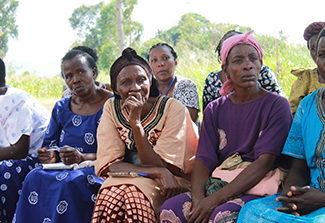Expanding bioethics from community engagement to genetics in Uganda
July/August 2023 | Volume 22 Number 4
 Photo by Caitlin Christman PMI/USAIDWomen participate in a community dialog in Uganda. Dr. John Barugahare worked to identify the best methodologies for ethical community engagement in Uganda when he was a Fogarty trainee. He now teachers in two Fogarty-funded bioethics training programs.
Photo by Caitlin Christman PMI/USAIDWomen participate in a community dialog in Uganda. Dr. John Barugahare worked to identify the best methodologies for ethical community engagement in Uganda when he was a Fogarty trainee. He now teachers in two Fogarty-funded bioethics training programs.
Dr. John Barugahare's interest in bioethics is rooted in his background in philosophy. His first in-depth work in bioethics was his Master of Philosophy thesis completed at the University of Bergen, Norway, in 2011 titled, "The Ethics of Scarce Health Resource Allocation: Towards Equity in the Uganda Health Care System." A senior faculty member and chair of the Department of Philosophy at Makerere University in Uganda, Barugahare currently sits on the research ethics committees at the School of Health Sciences and the Mulago National Referral Hospital, and teaches in two Fogarty-funded bioethics training programs at Makerere.
Early in his academic career, he studied political philosophy focusing primarily on social and distributive justice. Barugahare says, "From an ethical perspective, I was interested in figuring out how we can ensure we give priority to those in the poorest areas who urgently need access to health care the most." Following the completion of his Ph.D., he decided to pursue an academic career in bioethics with the hope of driving social justice in health.
In 2018, Barugahare joined Johns Hopkins University as a Fogarty-funded trainee in bioethics. He studied community engagement in research in Uganda, which was almost unheard of at the time outside HIV research, working to identify the best methodologies for ethical community engagement. During his time at Johns Hopkins, he took several courses in bioethics and was under the mentorship of senior faculty who helped the fellows identify research areas to write and publish their papers.
Uganda's first touchpoint with bioethics was in the early 1990s with the HIV/AIDs epidemic and mandates requiring community advisory boards and community engagement guidelines in HIV studies. The study of bioethics in the country continues to evolve. Efforts are being made to engage communities, protect vulnerable populations, and ensure ethical standards are upheld nationwide in research and clinical practice. Barugahare chaired a national task force that developed national guidelines [PDF] for bioethics in research in 2022. While these new guidelines have piqued the interests of potential bioethicists in the country, Barugahare says there are still several barriers to growing the number of professionals in the field.
"It is difficult to get the right people into master's level bioethics training programs, often because of the level of their work experience and lack of funding. On top of that, there are no obvious job opportunities for graduates apart from serving as administrators for research ethics committees, which is more administrative." He adds that most of these issues are not specific to Uganda or Africa as bioethics continues to find its place as a discipline across the globe.
On a more optimistic note, he says bioethics has become a more prominent part of the conversation in research. "In academia, most people know a little bit about bioethics and are interested, which was not the case before, and now that we have these two Fogarty-funded training programs, there is a great opportunity to grow."
Today Barugahare continues in his roles at Makerere and is currently a project lead on an H3Africa project titled "Genetics and Genomics Research Towards Context Specific Guidelines." The research team is asking Ugandans how they think genetics and genomics studies should be regulated, with the ultimate goal of developing context-specific guidelines for this type of research. He is also working on a paper to identify some more subtle issues that make it difficult for equity in global health research. "I chose this perspective because, in my view, you cannot achieve 'global health' if you cannot achieve equity in research because it all starts with what is researched in the sense of disease categories as a matter of priority, and issues of post-study access."
More Information
Updated August 15, 2023
To view Adobe PDF files,
download current, free accessible plug-ins from Adobe's website.
Related Fogarty Programs
Related World Regions / Countries
Related Global Health Research Topics